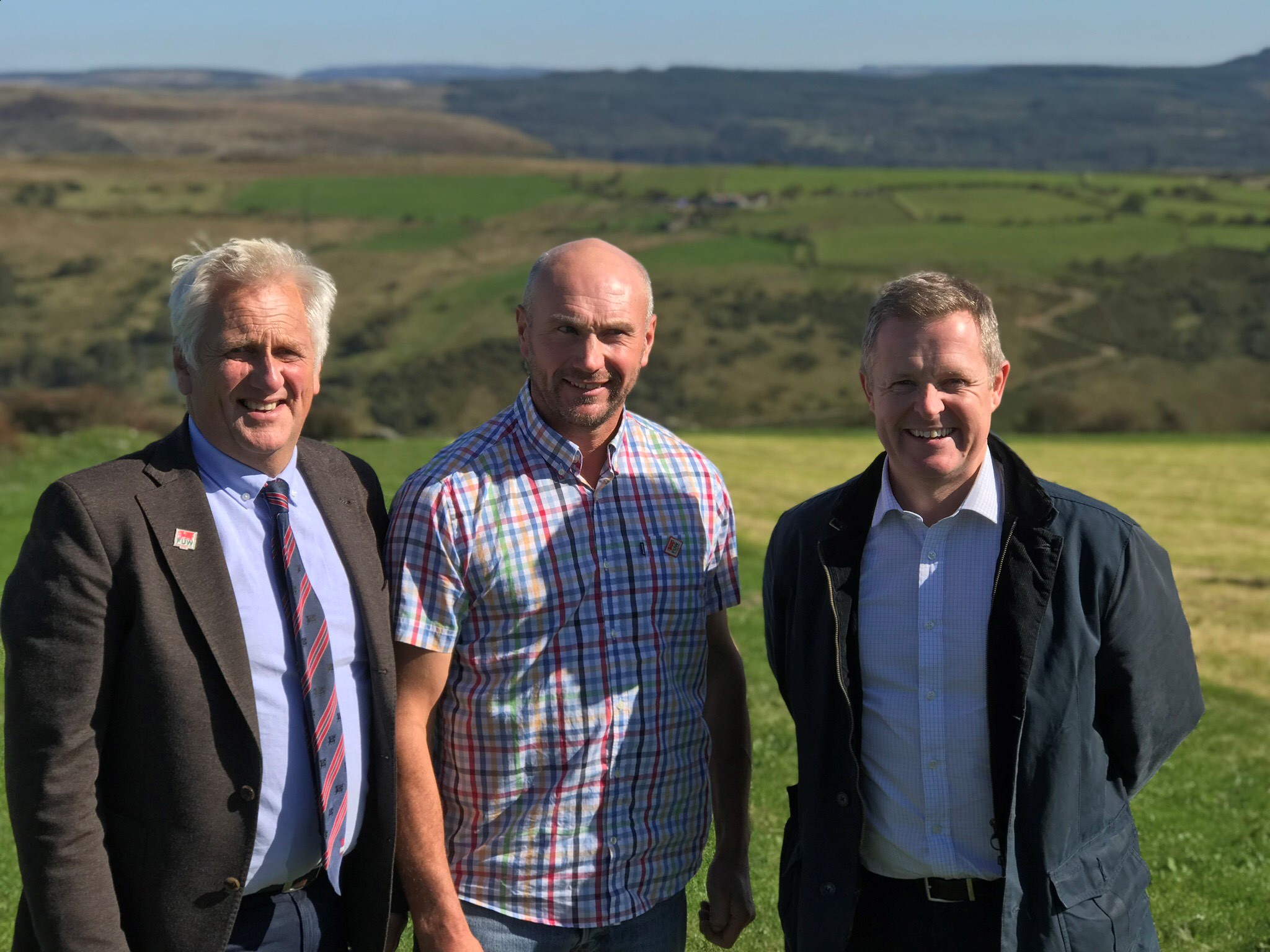 Farmers want to produce sustainable food and care for the environment, that was the message from 3rd generation livestock farmer Hywel Davies when he met with Welsh Brexit Minister Jeremy Miles AM.
Farmers want to produce sustainable food and care for the environment, that was the message from 3rd generation livestock farmer Hywel Davies when he met with Welsh Brexit Minister Jeremy Miles AM.
Hywel Davies, who farms at Perthigwion Farm, Rhydfro, Pontardawe, Swansea, opened the gates to the farm, which has been in the family since 1952, showcasing how food production and caring for the environment can and do, go hand in hand.
He owns 250 acres and rents 130 acres, keeping around 1000 sheep, 42 cows with calves as well as breeding around 35 rams a year for sale. The farm also has rights to graze two commons and is part of the Glastir Advanced Scheme.
Speaking on his farm, Hywel said: “I am the 3rd generation to farm this land. I care for it deeply and I care about how our food is produced. We have known for generations that if we look after the environment, the environment will look after us.
“So it worries me that 40% of the food that is being consumed in this country is imported and a fifth of the fresh foods imported come from areas that are threatened with climate chaos.”
Hywel has been actively involved with Coed Cymru and the Forestry Commission since 1988 as well as engaging in various conservation and regeneration schemes that go hand in hand with food production. He added: “Governments must wake up to the fact that farmers here in Wales are the answer to that problem. We support local livestock markets, maintain the local rural economy, support local jobs, as well as producing top-class food. But the way things are looking at the moment, I worry about the future of our sector is.
“Look at the price for sheep wool - it costs £600 for a contractor to shear the sheep and we only receive £200 from the Wool Board. We received £1.50kg for a lamb in Sennybridge Market last week, yet the price was £1.80kg the week before.
“The price of commodities seems to be falling rapidly. And yes, at the moment we can just about handle that, but what happens when we have no markets to sell to in 4 weeks time or we are faced with tariffs that make it impossible to keep producing food or have to deal with further regulations that prevent us from producing food in a sustainable way? Not to mention the very real possibility of direct support disappearing.
“What happens if we have to choose between food production and planting trees? If growing trees become more financially viable, where does that leave sustainable food production? Or will we be happy to increase our food imports, and with that our greenhouse gas emissions?
“Are we going to achieve what we set out to- reducing greenhouse gas emissions and feeding the nation- by supporting countries who produce food to standards that would be illegal in this country and make ourselves even more vulnerable to the ups and downs of global food prices and security? The answer I believe is no.”
Aside from worrying about the sustainability of the farm business, Hywel is also conscious and concerned about the farms' environmental footprint. Keen to provide green energy to benefit the environment and generate another income for the farm, the family purchased a wind turbine in November 2012.
“We are always looking for ways to positively contribute to nature, exploring ways to be cleaner and greener. That’s why we invested in the wind turbine. The problem now is that we don’t know what to do with our farm plastic. Birch Farm Plastics used to collect it for recycling but now we have to send it to landfill. That just doesn’t sit right with us and we hope that something can be done about it as soon as possible,” said Hywel Davies.
FUW President Glyn Roberts added: “The UK is supposed to achieve net-zero emissions by 2050, yet our food system is vulnerable and dominated by complex global supply chains. Our farmers have the knowledge, skill, and willingness to produce sustainable food, that works in harmony with the environment but they need to be allowed to do their job.
“If we want to save the environment and feed the nation, let’s focus on food that has been produced locally; food that has been produced in a sustainable and environmentally friendly way.
“The environmental audit committee has only recently called on the UK Government to set out a clear plan for how the UK’s food supplies could be protected from climate emergency and explain how food might be affected by Brexit, as well as asking Ministers to ensure that food provided by the Government is “sustainable by default”.
“Why has none of that been dealt with yet? We have 4 weeks before crashing out of the EU and nothing is sorted. Not with Brussels, not with the rest of the world and certainly not here at home.
“Yes the situation is complex but farmers have the answer to climate change and the looming food crisis. It’s time governments listen.”


